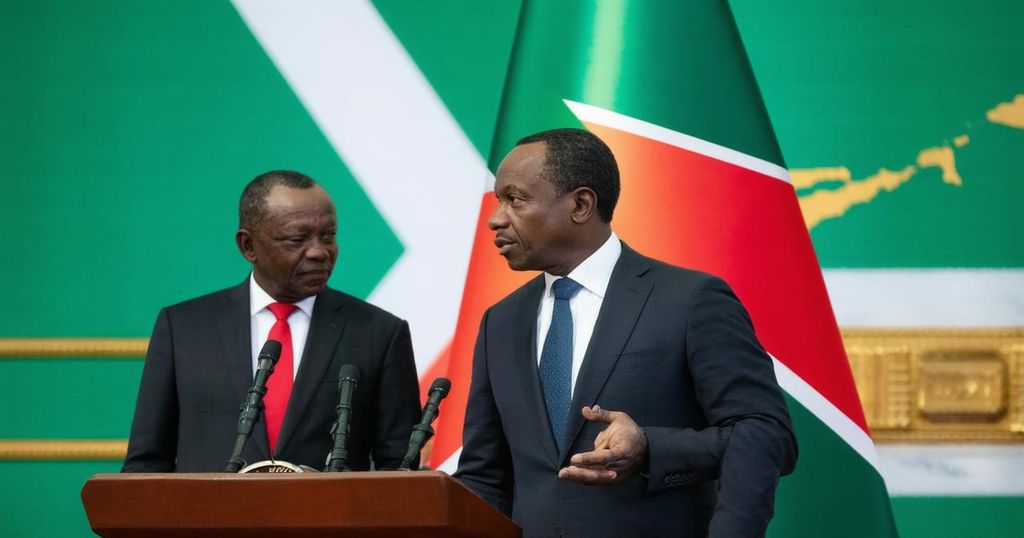South Africa Opposes Morocco’s Integration into BRICS Amid Ongoing Summit Discussions
The 16th BRICS summit, taking place in Kazan, Russia, has seen South Africa publicly oppose Morocco’s membership, citing concerns about influence dilution. The tension stems from the long-standing Western Sahara dispute. While South Africa rejects Morocco’s entry, China appears more open to economic engagement with Morocco. As various nations express interest in joining BRICS, the alliance faces challenges in balancing these political dynamics while fostering growth and cooperation.
The 16th BRICS summit commenced on October 22 in Kazan, Russia, with South Africa firmly opposing Morocco’s potential membership in this influential economic alliance. Gathering leaders from the BRICS nations—Brazil, Russia, India, China, and South Africa—the three-day summit, which concludes on October 24, has placed a significant emphasis on the matter of expansion within the bloc. According to reports from Bloomberg, South African officials have unequivocally articulated their opposition to including Morocco or Nigeria in BRICS, citing fears that such additions may undermine South Africa’s influence within the group. This sentiment was mirrored by unnamed officials from South Africa, who communicated their stance under a veil of confidentiality due to the sensitive nature of the issue. The longstanding discord between South Africa and Morocco over the Western Sahara dispute has been a pivotal factor in this development. Last April, South Africa successfully brought the Western Sahara issue to the forefront at a meeting involving deputy foreign ministers of BRICS. Tensions escalated in August when South Africa extended an invitation to Brahim Ghali, the leader of the Polisario Front, to attend the “BRICS/Africa” meeting in Johannesburg, shortly after Morocco declined an invitation from South Africa, citing deteriorating diplomatic relations. Morocco contended that South Africa’s invitation was a unilateral action rather than a collective decision endorsed by BRICS or the African Union. The North African nation has also refuted claims suggesting that it had applied for membership within BRICS. Significantly, BRICS has witnessed substantial expansions recently, integrating countries such as Iran, the United Arab Emirates, Ethiopia, and Egypt in early 2024, thereby enhancing the bloc’s economic power by aligning major energy producers with significant consumers in the developing world. Saudi Arabia has also been announced as a prospective new member but has yet to finalize its decision regarding membership. Russia, currently chairing BRICS, is keen to assert the summit as a demonstration of its global standing, despite international isolation due to its ongoing conflict in Ukraine. Kremlin foreign policy aide Yuri Ushakov revealed that the summit had attracted 36 national delegations and six international organizations, making it the largest assembly of global leaders in Russia since the invasion of Ukraine in February 2022. While South Africa remains resolute in its stance against Morocco’s membership, China appears to adopt a more conciliatory approach. In September, Moroccan officials were invited to participate in the BRICS Forum 2024 focused on industrial advancements, highlighting China’s willingness to engage Morocco in economic discussions despite South Africa’s opposition. As the summit progresses, further discussions surrounding the future expansion of BRICS and the navigation of competing geopolitical interests, while striving for economic cooperation, are anticipated to be central to the agenda. With interest expressed by additional countries such as Malaysia, Thailand, and Turkiye to join, the challenge of balancing these interests while fostering economic growth remains a critical concern for the alliance.
The BRICS group, established in 2009, traditionally includes Brazil, Russia, India, China, and South Africa. Recently, the bloc has expanded its member base significantly, adding Iran, the United Arab Emirates, Ethiopia, and Egypt, thereby reinforcing its economic influence. The BRICS nations have been engaging in discussions about potential further expansions, particularly in light of Morocco’s interest in joining, which has created tension with South Africa due to historical and political disputes, notably the ongoing conflict over Western Sahara. This intra-BRICS dynamic reveals the complexities and geopolitical challenges faced by the alliance, particularly as it endeavors to remain a formidable player on the global stage while managing conflicting national interests.
In conclusion, the 16th BRICS summit has underscored the complexities facing the alliance regarding membership expansion, particularly with South Africa’s staunch opposition to Morocco’s entry amid historical tensions. As BRICS navigates evolving geopolitical landscapes and increasing interest from various nations looking to join, it must balance these competing interests effectively while promoting economic cooperation and growth within its existing framework. The implications of South Africa’s position and China’s contrasting approach toward Morocco will undoubtedly shape the future conversations and decisions within this influential grouping.
Original Source: www.moroccoworldnews.com




Post Comment